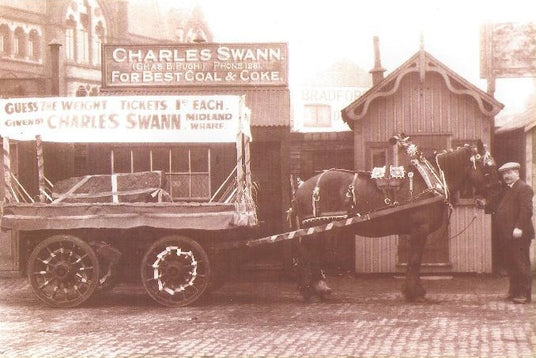Charles Swann Coal Merchants
Charles Swann was always a solid fuel merchant originating, it is believed, in the 1920’s.
The small sole-trader enterprise operated from a wooden shed in the railheaded goodsyard at Bradford Place Walsall. Swann was acquired by Chas. B. Pugh Walsall in the early 1930’s. A gentleman named Mr Vic Shaw managed Swanns for the next 25 years or so.

On retirement in the early 1960’s Vic Shaw was succeeded by former contracting bulk truck- driver Mr Bill Loynes. Having had experience with solid fuels Bill managed the business successfully for the next 20 years, always from Bradford Place, but in the elevated location of a 2 – storey traditional brick building.
This suited sales and accounting much better, and both coal & smokeless fuels were distributed by Swann’s own vehicles, unloaded from railtrucks in the neighbouring railyard. A 2500sq ft steel-clad building was used for machinery & hoppers to begin pre-packing the solid fuels.
In an expanding situation more substantial stocks of fuel were needed, more than Bradford Place goods yard could provide, & in a more secure premise.

This stockaded & tarmaced secure premises manifested itself 3 miles away at a Pugh Group- owned site at Rushall. Bill remained at the Bradford Place office overseeing admin, railborn traffic & the pre-pack and Malcolm, experienced son of Bill, managed the Rushall site.
Further expansion happened during the 70’s culminating with a move to Essington; Chas Swann’s current location in 1982. At this same time Malcolm became Managing Director on Bill’s retirement & Swanns became a limited company.

After initially tarmacing & stockading the 2 – acre site, installing offices & pre-packing units, large 12ft high hoppers & a weigh bridge, etc., Malcolm had a fruitful & dynamic 21 years with a “useful 2 – 3-man team”. Incoming fuel supplies were from the vested former nationalised coal & smokeless fuel companies & bigger private fuel companies. Also stocking, on a rental basis (toll-stocking), began in the mid-1980s.
Outgoing sales were collected by numerous traders whether loose, fed into their own hessian bags via the ‘large hoppers’ or pre-packed in polythene bags.
